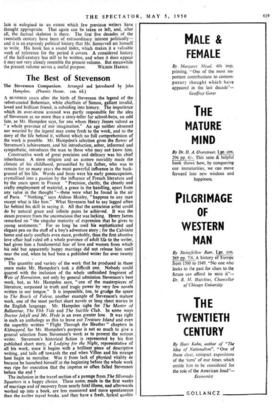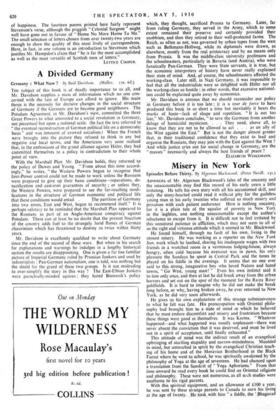The Best of Stevenson
The Stevenson Companion. Arranged and kntroduced by John Hampden. (Phoenix House. los. 6d.) A HUNDRED years after the birth of Stevenson the legend of the velvet-coated Bohemian, white chieftain of Samoa, gallant invalid, loved and brilliant friend, is subsiding into history. The impatience which its over-stress aroused was partly responsible for the idea of Stevenson as no more than a story-teller for school-boys, an odd fate, as Mr. Hampden says, for one whom Henry James valued as " a whole province of our imagination." An age neither obsessed nor wearied by the legend may come fresh to the work, and to the story of the life behind it, without which no full comprehension of the work is possible. Mr. Hampden's selection gives the flower of Stevenson's achievement, and his introduction, sober, informed and sympathetic, introduces the man to those who may not know him.
Constructive work of great precision and delicacy was his chief inheritance. A stern religion and an austere morality made the climate of his childhood, personified by his father, who was to remain for so many years the most powerful influence in the back- ground of his life. Words and form were his early preoccupation, crystallised into a passion by the influence of French literature and by the years spent in France " Precision, clarity, the cleanly and crafty employment of material, a grace in the handling, apart from any value in the thought "—these were what he found in the air of Paris. " Nothing," says Aldous Huxley, " happens to any man except what is like him." What Stevenson had to say lagged often far behind his skill in saying it. All that the conscious artist could do by natural grace and infinite pains he achieved. It was the steam pressure from the unconscious that was lacking. Henry James remarked on " the singular maturity of expression that he gives to young sentiments." For so long he used his sophisticated and elegant pen on the stuff of a boy's adventure story ; for the Calvinist home and early conflicts even more, probably, than the first abortive love affair had ruled oft a whole province of adult life to the writer, had given him a fundamental fear of love and women from which his odd but apparently happy marriage did not release him until near the end, when he had been a published writer for over twenty
years. •
The quantity and variety of the work that he produced in those years make Mr. Hampden's task a difficult one. Nobody could quarrel with the inclusion of the whole unfinished fragment of Weir of Hermiston, not only by general admission Stevenson's best work, but, as Mr. Hampden says, " one of the masterpieces of literature, surpassed in truth and tragic power by very few novels written in our tongue." It is impossible, too, to grudge the space to The Beach of Falesa, another example of Stevenson's mature work, one of the most perfect short novels or long short stories in the English language. Mr. Hampden sighs for The Master of Ballantrae. The Ebb Tide and The Suicide Club. In some ways Doctor Jekyll and Mr. Hyde is an even greater loss. It was right in such an anthology as this to leave out Treasure Island and even the superbly written " Flight Through the Heather " chapters in Kidnapped, for Mr. Hampden's purpose is not so much to give a general selection from Stevenson's work as to present the serious writer. Stevenson's historical fiction is represented by his first published short story, A Lodging for the Night, representative of all his work, since it begins with a brilliant piece of descriptive writing, and tails off towards the end when Villon and his strange host begin to moralise. Was it from lack of physical vitality or because he launched himself at the beginning before the whole work was ripe for execution that the impetus so often failed Stevenson before the end ?
The inclusion in the travel section of a passage from The Silverado Squatters is a happy choice. These notes, made in the first weeks of marriage and of recovery from nearly fatal illness, and afterwards worked up into a book, are less mannered and more spontaneous than the earlier travel hooks. and they have a fresh, lyrical quality
of happiness. The fourteen poems printed here fairly represent Stevenson's verse, although the priggish " Celestial Surgeon " might well have gone out in favour of " Home No More Home To Me." The small selection of letters chosen from over twenty-two years are enough to show the quality of this most lively of correspondents. Here, in fact, in one volume is an introduction to Stevenson which justifies Mr. Hampden's claim that " he is far the most accomplished as well as the most versatile of Scottish men of letters."
LETTICE COOPER.







































 Previous page
Previous page